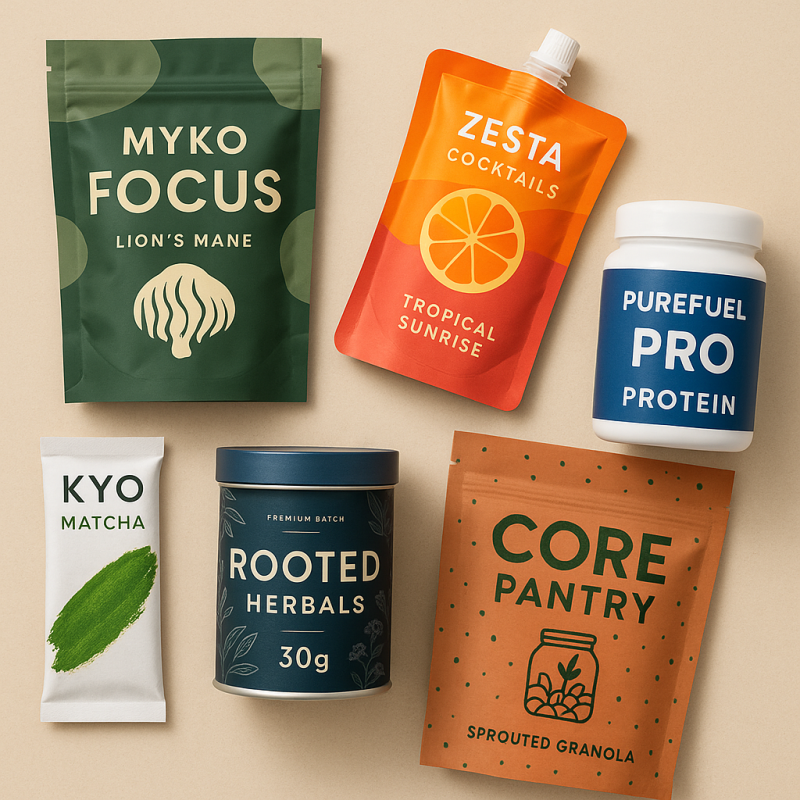DTC brands rarely get second chances so it’s important to make the right decisions when launching a new business. If products arrive damaged, spoiled or are expensive to ship, customer trust and margins can suffer. Whether you’re selling food supplements, custom cocktails or dry goods, choosing the right DTC packaging can make or break your growth. This guide covers the packaging formats that scale best in 2025.

Tubs are an easy and low MOQ option, but in many cases they’re an inefficient choice because they are bulky in transit and require labelling. Digitally printed stand-up pouches solve these problems. They are lightweight, take up less room, are highly customisable and can be printed with your artwork. Add resealable zippers and high‑barrier laminates, and you’ve got something that sells, scales easily and delivers.
Our pouches are also designed for recyclability and we have developed mono‑material structures which are already being trialled under the UK’s Simpler Recycling scheme. If you're in the nutrition or sports sector, our supplement packaging range is designed with DTC fulfilment in mind.
Spouted pouches offer a premium feel, easy pouring, and resilience where bottles fall short. They’re widely used across cocktail and RTD product formats, especially for fridge-friendly e-commerce orders.
For smaller servings or sample sizes, sachets or flat formats may be a better fit. Our spout pouch range includes both recyclable and standard laminates so you can customise your order based on your specific requirements.
Tins feel premium — until you need to fulfil 10,000 orders from a warehouse. They’re expensive to source, slow to produce, and often dent in transit. Flexible formats like custom printed pouches are better suited for ecommerce.
For tea, coffee and dry ingredients, stand-up pouches offer a resealable option with less weight and waste. If you’re targeting sustainability goals, our recyclable pouches are available across our tea & coffee packaging range.
You don’t need to design your packaging around postage costs but you should understand how the choices you make can affect fulfilment. Bulky packaging can push parcels into higher rate brackets. Choosing compact formats that ship flat means you spend less on packaging and more on the product itself.
If you're aiming for a low-friction fulfilment model or planning subscription SKUs, formats like sachets and lightweight stand-up pouches will scale more efficiently than alternatives like plastic tubs and glass jars.
Recyclability isn’t always the top priority — barrier performance, cost and shelf life often matter more. But the packaging landscape is shifting.
The UK is due to introduce kerbside collection of flexible plastics in 2027. Our recyclable pouches align with the latest FlexCollect trials and are built around the design-for-recyclability principles outlined by CEFLEX.
Life cycle analysis shows one thing clearly: packaging weight matters. Whether you're looking at carbon emissions or material efficiency, lighter packaging formats always win.
Flexible packaging often has a lower overall impact than rigid alternatives even when recyclability isn’t perfect. If you want to understand why, our guide on sustainable pouch performance breaks it down in practical terms.
If you’re exploring sustainable packaging but still need performance, SPS Pouches has you covered.
Gravure printing might work for huge runs — but it doesn’t suit brands launching seasonal SKUs or testing formats.
Digital pouch printing allows quick changes, no cylinder or plate fees, and low MOQs. We generally start at 1,000pcs but can split this into mulitple designs for you.
We tend to find that it's the fastest route to market for DTC, and gives you the flexibility to change designs between batches without long lead times or stock write-offs.
There’s no one-size-fits-all approach but for most DTC brands, stand-up, spout or sachet pouches offer the best balance of performance, cost and future readiness.
If you’re unsure which type of packaging makes the most sense for your products, talk to us. We’ll help you choose the right specifications — materials, barriers, print and finishing — based on what actually matters to your product, not just what’s trending.
If you have any enquiries concerning our pouch packaging, or would simply like to get in touch with our team, you can use the contact form or details below.